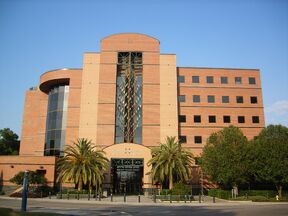| Empire of Ruthenia |
 This article is part of the series: |
|
|
|
Constitution and Law
The Monarchy
Basileus: Theodoros I Executive
Prime Minister: Vassilis Prevezanos Legislative
Political parties
Government Policy
Related Topics
Bank of Ruthenia |
The Social-Economic Council (Κοινωνικό-Οικονομικό Συμβούλιο; KOS) is a major economic advisory council of the Ruthene government. Formally it heads a system of sector-based regulatory organizations. It represents the social partners trade unions and employers' organizations. It forms the core organization of the corporatist and social market economy known as the polder model and the main platform for social dialogue.
History[]

KOS Building
The KOS was founded in 3256. It was founded after a long debate about the economic order of the Empire. The two main governing parties of the time, National and Labour Party. Both wanted to prevent the repetition of the economic crisis of the 3220s in Thracia. A compromise was found in the corporatist model, in which both trade unions and employers' organizations would form sector-based regulatory organizations. The KOS headed this structure and served as important partner for the imperial government. The KOS was very important in the reconstruction of Thracia after the Ruthene-Maurian War.
In the 3240s and 50s the KOS was particularly successful in ensuring economic growth by close cooperation between government, trade unions and employers' organizations.
Goals[]
The KOS has three main goals for Ruthene social-economic policy:
- To promote balanced and sustainable economic growth;
- To promote full employment;
- To promote a fair income distribution.
Organization[]
The KOS has thirty-three members. It consists of three sections, which each have eleven members in the council. These sections are trade unions, employers' organizations and government appointed members, the so-called imperial members. The trade union-members are appointed from the three major unions. The members of the employers' organizations are representatives from the three major employers' organizations. The government-appointed members are normally professors of economics or related fields and they include representatives of the economic planning agency and the National Bank. The board of the KOS is formed by four members of each section. The chair of the organization is always a imperial government appointee.
The KOS heads and oversees the system of sector-based regulatory organizations. These organizations can like other governments, provinces, water boards etc. enforce legislation for their members, in this case companies. The KOS is financed by levies which companies pay to the chambers of commerce.
